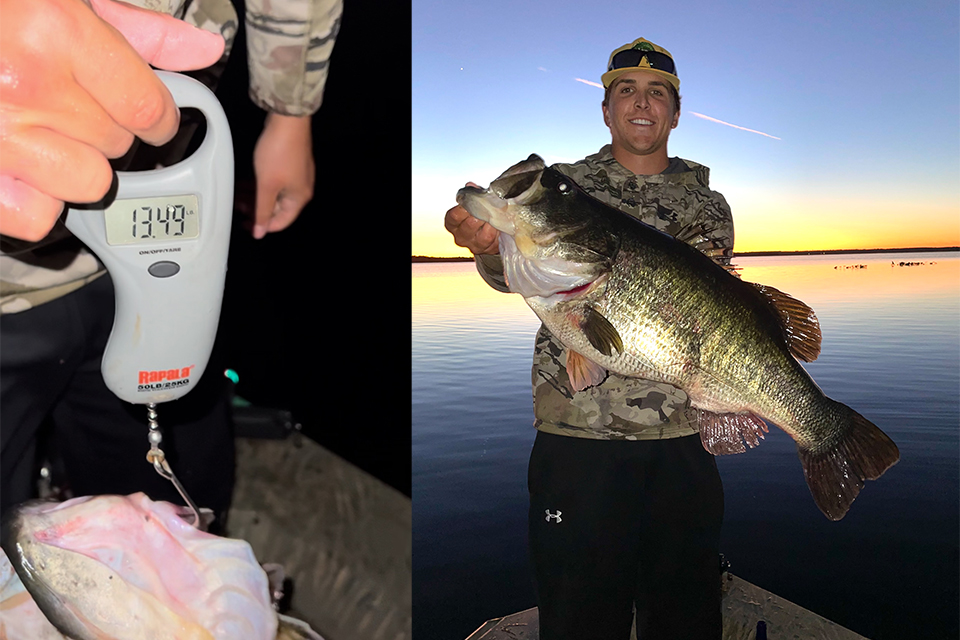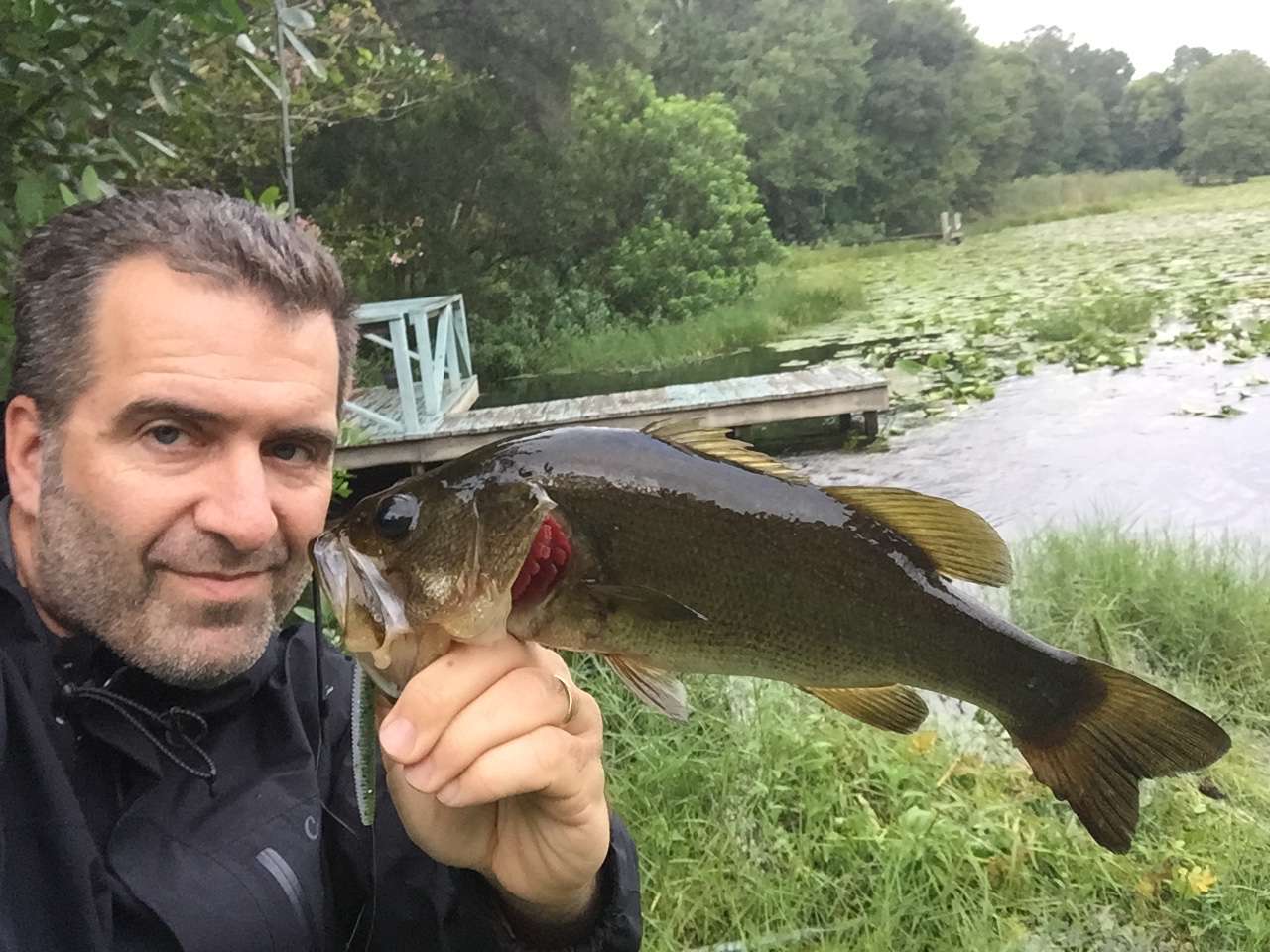
The following details were sourced from an incident report filed by the Florida Fish and Wildlife Conservation Commission (FWC). The agency’s officers and investigators are tasked with protecting fish, wildlife and their habitats as well as Florida’s residents and visitors.
Incident date: 3 February, 2023
At approximately 3 p.m., a Gainesville man identified as 24-year-old Luke Matthews launched his 14-foot aluminum boat into Orange Lake, a 12,550-acre Fish Management Area in southeastern Alachua County. While participating in a private competitive fishing event, Matthews encountered a largemouth bass (Micropterus salmoides) greatly exceeding any he had previously seen.
Hostilities ensued, with the bass forcefully assaulting Matthews’ personal property, later identified as a topwater frog. After engaging the fish in a physical struggle, Matthews prevailed through lawful methods and restrained the combative bass in a safe manner until he was able to record the details requisite for the FWC’s top-tier angler recognition.
In his words
A recent University of Florida (UF) graduate, Matthews has bass fished since the sixth grade, so he has a good handle on the sport. Thankfully, when a once-in-a-lifetime opportunity came his way, he kept a good handle on a fish that earned Hall of Fame status. (More on this in a moment.)
This triumphant tale starts with a Tuesday afternoon best-3, total inches tournament in which Matthews and his partner/classmate Andrew Owens took on two more UF students. Mathews and Owens, who earned their Construction Management degrees in spring of this year, had fished Orange Lake about 10 times, but never with the results they’d soon find.
“I had gotten a 14-foot Grizzly Tracker (welded aluminum boat) with a 25-hp Mercury 2-stroke on the back and a bow-mounted Minn Kota trolling motor to fish while I was at UF,” Matthews said. “That last semester we would go out a lot after class and fish the afternoons.”
Last-minute opportunity
Familiar with the lake’s offerings, Matthews and Owens targeted a small cove adjacent to a hydrilla flat in 4.5 feet of water. After catching their fish on a mix of shallow-water baits, including a Savage Gear DC Walker frog, the teammates were exiting the cove when a subtle hint bespoke a giant opportunity.
“It was prespawn so there’s always a chance (for a big fish),” Mathews said. “It was just starting to get warm, but it was cold that week.
“There was topped-out hydrilla on the flat, but the water had come up and mostly covered the grass. We could see bait moving around.”
That wasn’t the only thing they saw.
“It was getting dark, and we were idling with the trolling motor,” Matthews said. “I had put my rod down when (Owens) said, “What was that ripple?’
“We weren’t sure if we’d won the tournament, so we were like, ‘Sure let’s cast at it.’”
In what he’ll likely remember as the best decision of his fishing career, Matthews fired that bluegill colored frog toward a mild disturbance that immediately became a major explosion.

Difference maker
Describing that sundown strike, Matthews said: “It was like a 12-gauge went off.
“You know it has to be a fish at least 5 pounds because fish that big make a distinct sound when they bite a topwater bait. When I felt the weight on that fish, I thought, ‘Okay, it’s a big fish.’”
The fight was nothing short of astounding, and the big reveal came when Matthews’ fish attempted to air it out.
“The fish tried to come up and jump, but couldn’t get all the way out of the water,” Matthews said. “It was like slow motion, and I’m looking into that huge mouth.
“I was thinking, ‘Get it in the boat ASAP!’ With the heavy rod and line I was using, I was able to do that having to tire him out.”
An unexpected need
Geared for the tournament’s photo release format, Matthews and Owens had not packed a scale. This detail created a challenge that amplified the evening’s drama.
Realizing that they had to weigh the enormous fish, Matthews and Owens called the other team multiple times, but the other anglers were wrapping up their trip, trailering and stowing gear. From the time Matthews landed the fish, until the time he finally got the scale in his hand was 12 minutes.
With no livewell, time past glacially, as Matthews gripped his enormous fish by the lower jaw and held it just below the surface.
“All this time, the fish was upright and breathing fine,” Matthews said.
Recalling the post-catch feeling, he described a mix of relief the fish was handling the situation well and a simmering anxiety over his school mascot’s very real namesake.
“I did have my buddy looking out for gators the whole time — it’s Orange Lake,” he said. “It was stressful with the odds of me losing that fish, but thankfully, the fish was calm — No. 1 for its health and No. 2 for not attracting any gators.”
The big reveal
Near the evening’s conclusion and prior to Matthews’ catch, the other team called to touch base. Notwithstanding the mutual bluffing, it was clear the other guys thought they might be claiming the $25 prize.
Seriously though, how could they have expected to see their buddies roll up with a 13.49-pounder?
Upon leaving their cove, Matthews and Owens had a couple of fish close to 2 pounds and a 3-pounder for about 55 inches. Replacing their smallest with this 26 1/2-inch monster boosted their total to 66 and popped their competitors’ wishful balloon.
“When they saw that fish, they knew they’d lost,” Matthews said. “Some of the comments were a little explicit, but the general thought was, ‘So they do exist!’”
Putting his catch into perspective, Matthews compared the fish to his saltwater pursuits.
“When you get a bass over 10 pounds, it’s like a grouper,” said Matthews, whose previous best was a 7 1/2-pounder from Georges Lake. “They’re so much bigger than the average size fish you catch they don’t even look like bass at that size.
“I would take a bass heavier than 5 pounds over a 30-inch redfish any day.”
A fond farewell
The FWC’s TrophyCatch program comprises a statewide effort through which the agency collects data on largemouth bass and promotes Florida fishing. Bass of 8 to 9.9 pounds earn Lunker Club status, while those of 10 to 12.9 pounds enter the Trophy Club.
The pinnacle: a Hall of Fame bass reaching or exceeding the 13-pound mark.
This optional program encourages anglers to submit (photo/video) documentation of their big bass, along with length, girth, weight and location information. Big fish details provide invaluable data that guides management decisions, so FWC rewards participation with various prizes.
Probably the biggest reward Matthews took from that night was the gratification of watching his new personal best disappear into Orange Lake.
“It was bittersweet when she swam off,” Matthews said. “I knew that a fish that size is going to be nearly impossible to top.”
No charges were filed in this incident. (wink)
For more information on the TrophyCatch program, visit www.trophycatchflorida.com.

